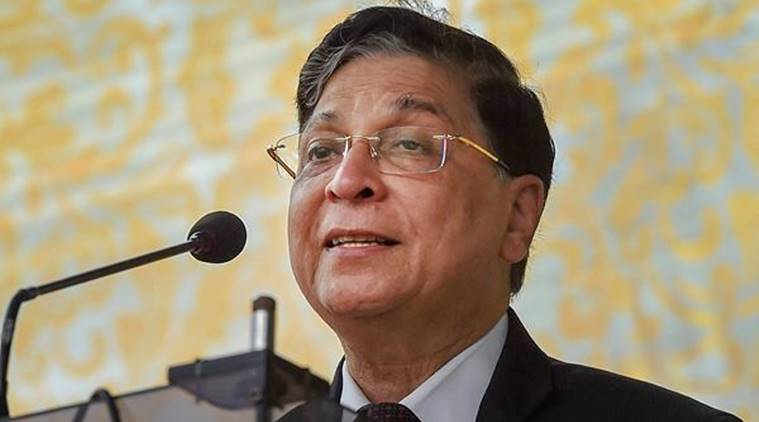 “As has been told, the Supreme Court is one. The Bar fosters us, nurtures us and, on every occasion, I have told the young members of the Bar, be the guiding angels,” CJI Dipak Misra said. (PTI)
“As has been told, the Supreme Court is one. The Bar fosters us, nurtures us and, on every occasion, I have told the young members of the Bar, be the guiding angels,” CJI Dipak Misra said. (PTI)
At the centre of a storm within the Collegium which has been in a standoff with the government over the appointment of judges, Chief Justice of India Dipak Misra on Friday said “the Supreme Court is one” and there is need for cordial relations between the Bar and the Bench.
“As has been told, the Supreme Court is one. The Bar fosters us, nurtures us and, on every occasion, I have told the young members of the Bar, be the guiding angels. It’s not the age, but the entry into the Bar that makes you an angel. Whatever your status is, whatever your stature is, it is the duty of judges to show respect to members of the Bar despite their age or status. I personally and individually feel so and do so. You are welcome to contradict me,” CJI Misra said.
He was speaking at a farewell meeting organised by the Supreme Court Bar Association for Justice R K Agrawal who retired Friday. With Justice Agrawal’s retirement, the count of the judges in the Supreme Court is now 24, as against the sanctioned strength of 31 judges. Justices J Chelameswar, Ranjan Gogoi and Kurian Joseph — along with CJI Misra and Justice Madan Lokur, they make the Collegium — were not present at the farewell meeting. In January this year, they had questioned the conduct of the CJI, especially on the allocation of cases. Justices Chelameswar and Joseph were on leave Friday.
Justice Agrawal too called for unity between the Bar and Bench but did not mention anything about the current crisis in the judiciary. “Faith on the judiciary of the common man and speedy justice mainly depend on the cordial relations between the Bar and the Bench and the role of the Bar is equally important to the Bench in the administration of justice. Rendering justice is their joint responsibility. In short, justice cannot be imparted without the active support of the Bar members,” he said.
SCBA president Vikas Singh referred to a speech delivered by Justice Agrawal at the Madras High Court when he was elevated to the Supreme Court and said it was very relevant for the judiciary at present. In that address, Justice Agrawal had said, “Friends we will come and go, but the institution shall remain. We should not do anything to damage its name. As you are aware, it takes years to build a reputation and only a moment to destroy it. We have to be very careful in our conduct. The danger is from within, and not from outside. We have to be very careful in our acts.”
The CJI described Justice Agrawal as “a pride of the Supreme Court” and an “extremely spiritual” person. “Unless you are spiritual, you cannot learn silence. Spirituality in Justice Agrawal has made him silently powerful… a lesson all members of the Bar can learn is that sometimes silence is eloquent arguments and eloquent arguments is sometimes meaningless,” he said.
“We respect the Bar… your request is our command,” the CJI said, and “that is why, till today, I have never refused to attend any function of the Bar.” He said he hoped to maintain the cordiality with the Bar in the future too. He recalled his first meeting with Justice Agrawal in Allahabad. “I met him first on the banks of the Ganges, that is Allahabad. I noticed that the judge was silently eloquent and simultaneously eloquently silent. Our second meeting was at Jabalpur where he had come to meet some relations. I found he had three qualities — resolve, reserve and reason. Then I met him in Chennai, where there is sea, and then here where there is Yamuna. Now please connect — Ganges, Narmada and Yamuna. I would like to call them a conceptual trinity. This conceptual trinity has to have association with reason, resolve and reserve of Justice Agrawal.”
Referring to the words of SCBA president Vikas Singh who spoke before him, the CJI said “that is why, as the president of the Bar said, he (Justice Agrawal) was silent when he came and he became absolutely resolute when he presided, but the Bar saw the reserve and the reason. Therefore, there was no complaint, no grievance and for that matter, no dissatisfaction.”